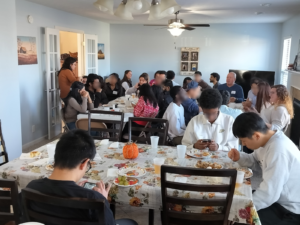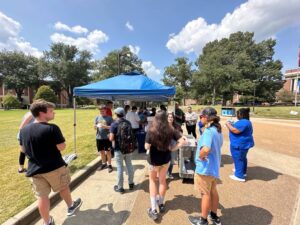As a campus ministry leader, we are missionaries to the campus. Just like any mission, campus ministry has a “missional code” that needs to be broken.
A Perspectives course I took revealed embracing learning is an essential first step for any missionary. We must learn the culture and language of the people we want to reach—this is no different on a college campus. In The Fuel and the Flame, Steve Shadrach likens preliminary research to becoming the Sherlock Holmes of your campus. You need to investigate everything you want to know, and then seek out everything you don’t want to know!
Find and memorize demographics, take the freshman campus tour, patron the boring campus museums, meet other campus leaders, and, if possible, connect with administration. One of the more important things to discover are the different people groups that make up your campus. Once you’ve identified the individual groups, ask students to help you rank them in order from most influential to the least influential. Find out from other ministries which groups are most targeted and which groups are looked over. Brainstorm ideas for making disciples in every group on campus.
The more you know about the people on your campus, the more influence it will have on the path your mission takes. As Stephen Lutz puts it in The Gospel Coalition article “5 More Shifts for Missional College Ministry,” targeting people-groups helps shift perspective “from reaching vague ‘everyones’ to specific ‘someones.’” Instead of a generic sweep, you can reach individuals. In his challenging ebook Campus Renewal, Justin Christopher explains a similar strategy called “Spiritual Mapping.” Campus ministers are asked to give demographic information about their students and their perspective of what God is doing on campus. And students are asked about their own spiritual activity.
From this information, campus ministry leaders worked together to create a strategy for reaching all students. Reaching the campus isn’t complete until a missional community is reaching every people group on campus. (Read more about Spiritual Mapping here.) You must know the specific context in which you are leading your ministry.
The strategy for reaching inner city community colleges is very different from a small college town environment like Chico, CA. The strategy for reaching a campus that has 200+ ministries is different than a campus with no large ministries. Unless you really know your campus, you may be using strategies that aren’t suited to your mission field.
Here are some questions to help start your research:
Student Body
How many students attend the university?
What are the demographics?
How many live in the dorms?
What is the average student on campus like?
What are their study habits?
Where do they live?
When do they party?
Do they go home for the weekend or stay in town?
How many have full- or part-time jobs?
Student Groups
How many are involved in the Greek system?
What are the most common majors?
What are the most influential groups on campus?
Who are the most influential individuals?
What is the athletics program like?
How many internationals?
What are the most popular student clubs?
Outreach Opportunities
What are the largest campus events?
Is there a “Welcome Week” or “Move-in Day” that you can help with?
What are the “hot spots” for students to hangout?
Campus Ministry
What Christian groups are active on campus?
Who are the Christian groups primarily reaching?
What is the most “unreached people group” on campus?
Campus Resources
What could be the best place to hold events and Bible studies on campus?
Are there any faculty or staff who are believers?
Spiritual Need
What are the biggest needs of the campus community?
What are the perceived needs of the students?
What strategies for evangelism are working on similar campuses?
Research takes time, but don’t pull out of active outreach or fall into analysis paralysis. Don’t use this learning phase as an excuse to neglect your mission. God is calling you to reach students—get after it! Just be sure to start with a humble and flexible strategy that adapts to the campus context as you go. Never stop learning about your campus. In my fourth year at Chico, I am still discovering new information. Keep a humble posture of learning. Work smarter, not harder.
Discussion Questions
What steps do you need to take to begin to decode your campus?
Make a list of the people groups on campus. Which would you say are most influential?
Which group are you called to reach out to first?






